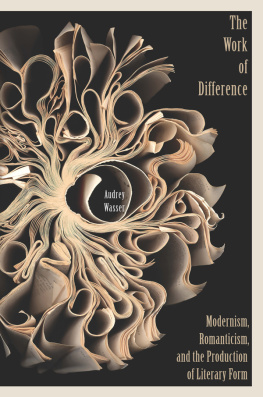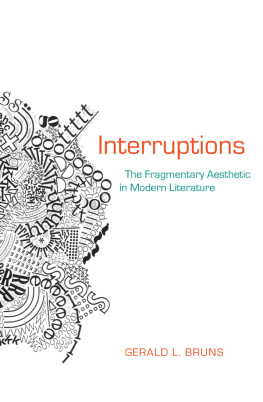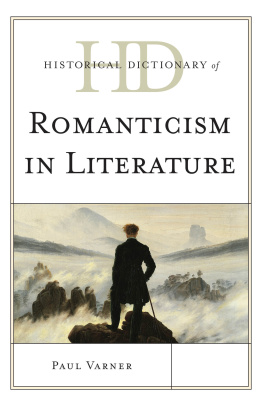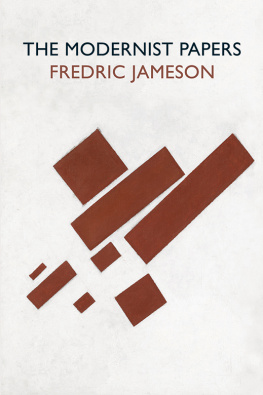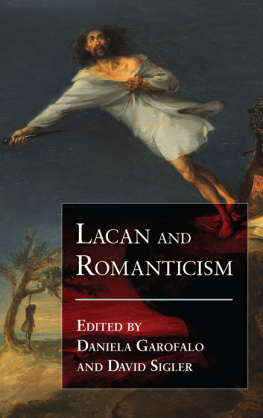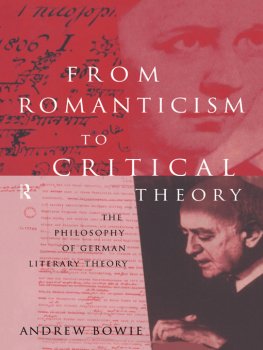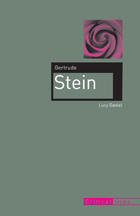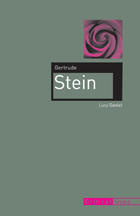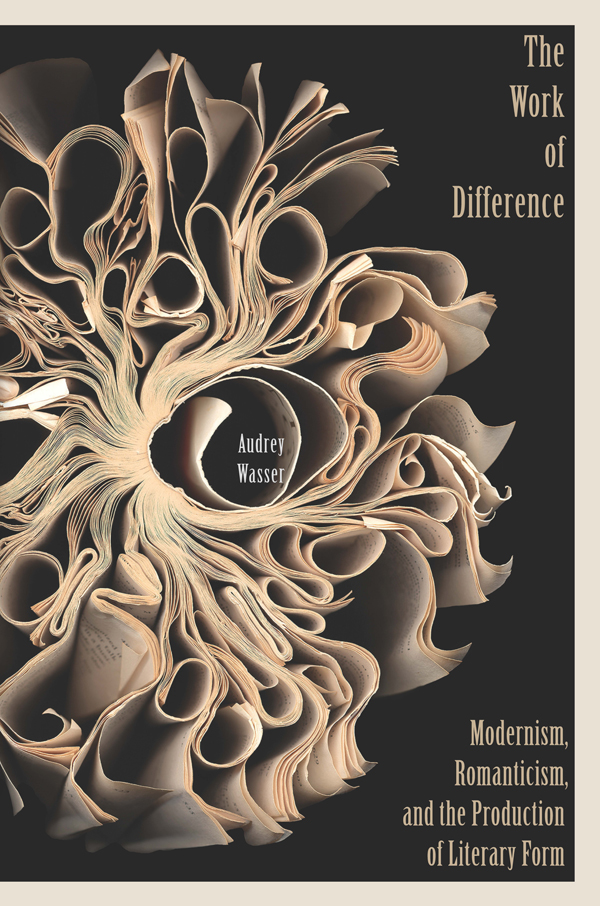This book is made possible by a collaborative grant from the Andrew W. Mellon Foundation.
All rights reserved. No part of this publication may be reproduced, stored in a retrieval system, or transmitted in any form or by any meanselectronic, mechanical, photocopy, recording, or any otherexcept for brief quotations in printed reviews, without the prior permission of the publisher.
Fordham University Press has no responsibility for the persistence or accuracy of URLs for external or third-party Internet websites referred to in this publication and does not guarantee that any content on such websites is, or will remain, accurate or appropriate.
Visit us online at www.fordhampress.com.
Wasser, Audrey.
The work of difference : modernism, romanticism, and the production of literary form / Audrey Wasser.
Includes bibliographical references and index.
1. Literary form. 2. Criticism. 3. Modernism (Literature) I. Title.
The problem of art in the modern era is the problem of the new. Most of our assumptions and desires about artthat it be creative and thought-provoking; that it be produced by a person of genius; that it be something as yet unseen in the world, let alone unseen in the classroom or the museumall of these circle around the fundamental proposition that the artwork is the new work. Even when we praise a works timeless or universal qualities, perhaps some power of imagination shining through the work, we are liable to agree that if there is not something new about it, perhaps something formally new, it does not really count as art. If we look back to the early twentieth century, to the experimental ethos of literary modernism epitomized by Ezra Pounds exhortation to make it new, and beyond that to the early nineteenth century, to romanticisms valorization of modernity against neoclassical standards of beauty, we readily see that newness has a particular history.
Newness, in no small way, is our inheritance. This book is concerned with literary modernism from the perspective of this inheritance: with a poetics of the new that belongs to modernisms self-understandingand which, I will argue, has still not been adequately theorized. Instead, a certain nineteenth-century way of thinking about the new continues to hold sway over the way we read modernist texts. Rather than contest the value of the new, my goal is to consider the terms in which the new has been transmitted to us, terms that end up dragging a whole set of unquestioned, metaphysical assumptions in their wake.
These assumptions find their strongest formulation in the literary-critical writing of the early German romantics. My argument thus begins with a reexamination of the claim made by a number of critics about the decisive importance of romanticism to contemporary ideas about literature. In particular, I show how the experimental writing of early German romanticism, especially as this writing engaged with the system-building philosophy of its time, left us with a legacy that continues to control the way we think about literary newness, literary form, and the relationship between literature and truth. Not only does this legacy dominate popular ways of thinking about literature; it determines in advance even the most critical or searching questions scholars are able to pose, furnishing almost all of the terms we have at our disposal to pose them.
Romanticism is the word I use to zero in on this moment in Germany following on the heels of Kantian philosophy, which witnessed an extraordinary imbrication of philosophical ideas and experimental literary and critical practice. Romanticism might be one of the most debated terms in literary scholarship, having been used to label a tremendous diversity of texts and trends, but one thing that emerges definitively in this period is a characterization of literatureindeed of art in generalprimarily in terms of invention. The turn away from neoclassicism that romanticism represented, and from the value neoclassicism placed on rules derived from classical texts, took the form of an as yet unseen valorization of the modern and the interesting, and perhaps of the new as such. This treatment is prefigured in Kants third Critique (1790), which defined the aesthetic in terms of its autonomy with respect to systems of knowledge and reason. Through Kant aesthetic experience was freed from the domain of the concept, from rational calculation, from the telos of perfection, and from the production of art on the basis of rules of beauty. Romanticism inherited these Kantian assumptions, shifting them from the realm of reception to that of production.
Philosophical and cultural factors have conspired, in short, to bequeath to the present the question of art as, fundamentally, a question of the new. Newness names a problem, however, if not an outright paradox. The paradox it presents takes the following form: if, on the one hand, the truly new work must break with its existing context, then, on the other hand, it must still be recognizable in some fashion, and be recognizable as art.
The problem, in other words, is whether the event or rupture that the new work of art supposedly is can be apprehendedor even thoughtoutside of existing institutions and outside of existing systems of determination, expression, and reception. The imperative to grasp art as new confronts the deeper, conceptual difficulty of how one ought to negotiate the relation between system and event, or between history and innovation. How is it that new works or new forms are possible within the determinate orders of history, language use, or the social? How are they in turn recognizable to already-existing institutions? These questions demand careful answers if we hope to move beyond mere assertion in statements of method. Indeed, if we do not have a way of articulating the conceptual relationship between what is and what is not new, how can we hope to tackle the question of what is and what is not literature?
The question of literature has been posed with the greatest urgency in the postwar French context, from Sartres Quest-ce que la littrature? (1947) to the critical writings of Blanchot and Derrida. Within this tradition, the question of literature has served as the occasion for articulating some of the most fundamental problems of twentieth-century thoughtthe problem of the event, for example, and of the relation between structure and genesis. In fact, I would venture so far as to say that literature became a question for French philosophy in this period above all because literature is another name for the problem of structure and genesis, or of system and event. My own project draws on the insights of this tradition, especially on ways of reading that it made possible. But it departs from this tradition in the answers it provides.
So this book addresses an ontological questionWhat is literature?concerning a historically contingent object and a posing that has itself unfolded historically. But this book is more than a genealogy of the concept of the literary work of art. I work through a diagnosis of present assumptions about the integrity of the work, and about the relationship between the work and the world beyond it, in order to unearth the philosophical basis for these assumptions. Undertaking a critique of these assumptions, with the aid of a different set of philosophical concepts, I attempt to construct an alternative account of literary production. That is, the aim of this book is to articulate a non-romantic theory of literature.

